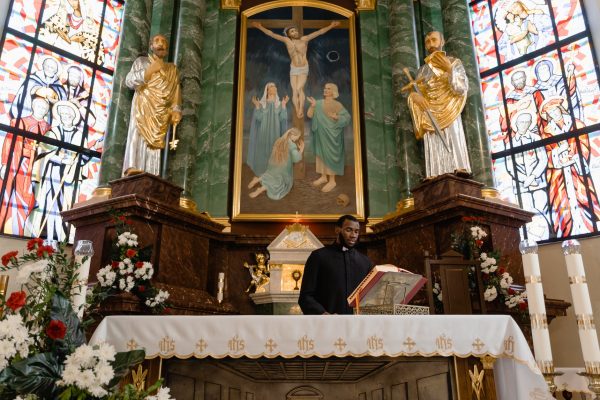While many congregations have returned to regular attendance after the 2020-2021 health restrictions, no one can forget what it was like trying to find Christian community and commemorate Christian holidays during the pandemic’s peak. In this 2020 reflection, Ben Fearn ponders what it means to celebrate death and resurrection:
The last year has been incredibly difficult for everyone. Whether it’s through bereavement, financial hardship, job losses or simply missing human interaction we’ve all felt a sense of collective grief because of Covid-19.
As human beings, whether Christian or not, we find solace in the so-called little things: a handshake, a hug, a catchup over a coffee with a friend or a pint in the pub. It’s the little things that can make a world of difference, yet throughout much of the last year even the little things have been hard (or legally impossible) to do.
Easter is the most important time of year in the Christian calendar, but in 2020 my worship was restricted to a 40-minute Zoom service with my church in Darley Dale. As lovely as it was to collectively join in praise in some form, it still felt like a sucker punch to not be able to greet people in person.
I was fortunate enough this year to be able to go to church in person, thanks to the next step of the UK’s gradual easing of lockdown. Even this was restrained, as congregation numbers were limited by social distancing, mask wearing and safety guidelines. There were no joyous hugs, as much as people wanted them! Yet being physically inside a church for the first time in months felt immensely comforting.
We’re never meant to have it easy as Christians!
It’s hard not to look back to some sort of ‘golden age’ of church fellowship whenever we struggle on through the pandemic. It’s comforting to think back to a time when hugs were flowing and hymns were sung at full volume. But we must still count our blessings. Persecution is still rife across the globe against believers of all faiths and sceptics alike. Freedom of worship is a basic right which nevertheless isn’t shared by all. The early church often went into hiding, yet were told by Jesus “Go! I am sending you out like lambs among wolves” (Luke 10:3).
It’s immensely difficult not to be able to see our friends and family in the ways that we used to, and we shouldn’t downplay that fact. It’s hard not to think of the line from John 15:13 – “Greater love has no one than this: to lay down one’s life for one’s friends”. Jesus paid the ultimate sacrifice, and we can remember that in any which way we can throughout the pandemic and beyond.
Times are often hard, but we can still take comfort in the little things, even if they’ve changed slightly. The world is more interconnected now, and in most cases we’ve been able to see each other’s faces and keep in touch remotely. Had the pandemic happened even 20 years ago large communities would have been even more isolated. Church Zoom services have given us a sense of fellowship, however different it is to what we’re used to.
‘Tedious atheism’
There’s no other way to describe it. The likes of Richard Dawkins and Professor Alice Roberts often seem to trigger themselves around these special Christian holidays, with the latter rather lazily Tweeting on Good Friday that “Just a little reminder today. Dead people – don’t come back to life”. And I thought the concept of certainty was a religious thing! It’s often the case that some of the most intelligent atheists make the biggest strawman arguments; Professor Roberts didn’t even get the day right.
It’s not much to ask that people of all faiths get to enjoy religious festivals peacefully? Thank goodness for the sassy reply of Fergus Butler-Gallie on Twitter to Professor Roberts, who said “ur gonna [expletive deleted] the bed Sunday morning hon x” Perhaps the answer to ‘tedious atheism’ is ‘sassy Christianity’?
‘Easter songs’?
This is a minor point from me, but I noticed a good point on Twitter the other day that we don’t really have ‘Easter songs’. There are Easter hymns of course, just like there are Christmas carols – but we have plenty of secular songs to mark Christmas and the Winter season as well.
Perhaps someone is missing a trick? I guess the previously much heralded ‘Christmas Number 1’ in the singles charts is hard to replicate into the ‘Easter Number 1’. I’ll no doubt be corrected on these points, but I’m hard pressed to think of secular Easter songs off the top of my head. It’s these seasonal gaps that make hearing time-appropriated hymns all the more special due to their rarity for the rest of the year: think ‘Thine Be The Glory’ and ‘Christ The Lord Is Risen Today’.
The way forward
We will be able to worship in the ways that we used to soon. Things will get better. For now we must focus on the global community where we can: to victims of war, poverty, racism, antisemitism, Islamophobia, misogyny, violence and terror. These evils haven’t gone away just because there’s been a pandemic; we must always strive to do more to prevent them. Let the legacy of the pandemic be for the Church to emerge from it emboldened to do good.
I’ll finish by wishing you all a very happy Easter and a spiritually enriching 2021. Peace be with you.
“And surely I am with you always, to the very end of the age” (Matthew 28:20).

